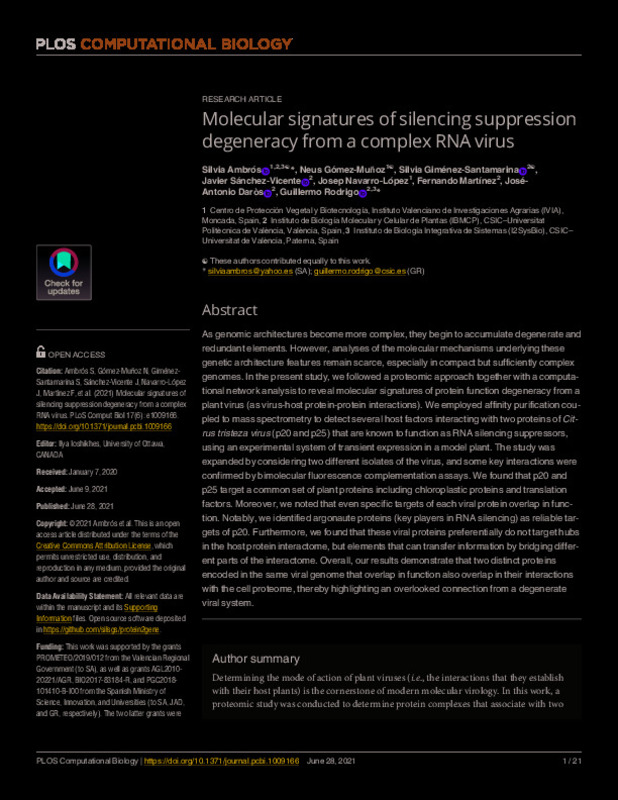|
Resumen:
|
[EN] As genomic architectures become more complex, they begin to accumulate degenerate and redundant elements. However, analyses of the molecular mechanisms underlying these genetic architecture features remain scarce, ...[+]
[EN] As genomic architectures become more complex, they begin to accumulate degenerate and redundant elements. However, analyses of the molecular mechanisms underlying these genetic architecture features remain scarce, especially in compact but sufficiently complex genomes. In the present study, we followed a proteomic approach together with a computational network analysis to reveal molecular signatures of protein function degeneracy from a plant virus (as virus-host protein-protein interactions). We employed affinity purification coupled to mass spectrometry to detect several host factors interacting with two proteins of Citrus tristeza virus (p20 and p25) that are known to function as RNA silencing suppressors, using an experimental system of transient expression in a model plant. The study was expanded by considering two different isolates of the virus, and some key interactions were confirmed by bimolecular fluorescence complementation assays. We found that p20 and p25 target a common set of plant proteins including chloroplastic proteins and translation factors. Moreover, we noted that even specific targets of each viral protein overlap in function. Notably, we identified argonaute proteins (key players in RNA silencing) as reliable targets of p20. Furthermore, we found that these viral proteins preferentially do not target hubs in the host protein interactome, but elements that can transfer information by bridging different parts of the interactome. Overall, our results demonstrate that two distinct proteins encoded in the same viral genome that overlap in function also overlap in their interactions with the cell proteome, thereby highlighting an overlooked connection from a degenerate viral system.
[-]
|
|
Código del Proyecto:
|
info:eu-repo/grantAgreement/AEI/Plan Estatal de Investigación Científica y Técnica y de Innovación 2013-2016/BIO2017-83184-R/ES/VIRUS DE PLANTAS: PATOGENOS Y TAMBIEN VECTORES PARA LA PRODUCCION DE PROTEINAS, METABOLITOS, RNAS Y NANOPARTICULAS/
info:eu-repo/grantAgreement/GVA//PROMETEO%2F2019%2F012/
info:eu-repo/grantAgreement/AEI/Plan Estatal de Investigación Científica y Técnica y de Innovación 2017-2020/PGC2018-101410-B-I00/ES/BIOLOGIA DE SISTEMAS DE RIBORREGULACION SINTETICA: TERMODINAMICA, RUIDO Y OPERABILIDAD/
info:eu-repo/grantAgreement/MICINN//AGL2010-20221/ES/BASES MOLECULARES PARA EL DIAGNOSTICO Y CONTROL DE LAS CEPAS VIRULENTAS DEL VIRUS DE LA TRISTEZA DE LOS CITRICOS (CTV)/
|
|
Agradecimientos:
|
This work was supported by the grants PROMETEO/2019/012 from the Valencian Regional Government (to SA), as well as grants AGL2010-20221/AGR, BIO2017-83184-R, and PGC2018-101410-B-I00 from the Spanish Ministry of Science, ...[+]
This work was supported by the grants PROMETEO/2019/012 from the Valencian Regional Government (to SA), as well as grants AGL2010-20221/AGR, BIO2017-83184-R, and PGC2018-101410-B-I00 from the Spanish Ministry of Science, Innovation, and Universities (to SA, JAD, and GR, respectively). The two latter grants were co-financed by the European Regional Development Fund. The funders had no role in study design, data collection and analysis, decision to publish, or preparation of the manuscript.The funders had no role in study design, data collection and analysis, decision to publish, or preparation of the manuscript.
[-]
|









